Key takeaways:
- Service excellence is defined by consistently exceeding customer expectations, creating memorable and personalized experiences that foster loyalty and trust.
- Customer satisfaction is crucial for business success, driving loyalty, referrals, and revenue growth, while emphasizing the importance of reliability, responsiveness, and empathy in service quality.
- Empowering employees enhances service quality and customer satisfaction; gathering and implementing feedback effectively improves service performance and strengthens customer relationships.
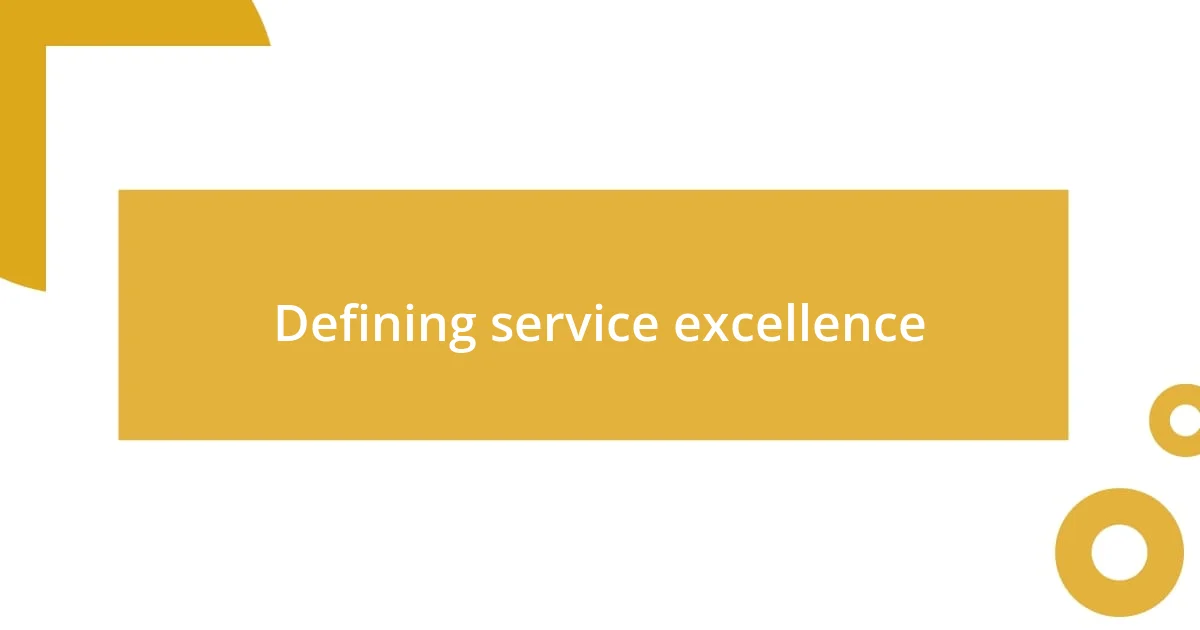
Defining service excellence
Service excellence encompasses not just meeting customer expectations but consistently exceeding them. I remember a time when a hotel staff went out of their way to find my lost luggage, making me feel valued and cared for during an unexpected situation. Can you recall a moment when someone’s exceptional service turned around your day?
When I think about service excellence, it’s about creating memorable experiences that resonate on a personal level. For instance, a café I often visit keeps my favorite drink ready when they see me approach; it’s those small gestures that build loyalty and trust. Isn’t it fascinating how a little attention can transform a transaction into a connection?
Moreover, service excellence should involve understanding and anticipating customer needs. I’ve often marveled at companies that seem to know what I need before I do, adapting their offerings just in time. What would it be like if every interaction left you feeling understood and appreciated? It’s this kind of foresight that truly defines service excellence in my eyes.
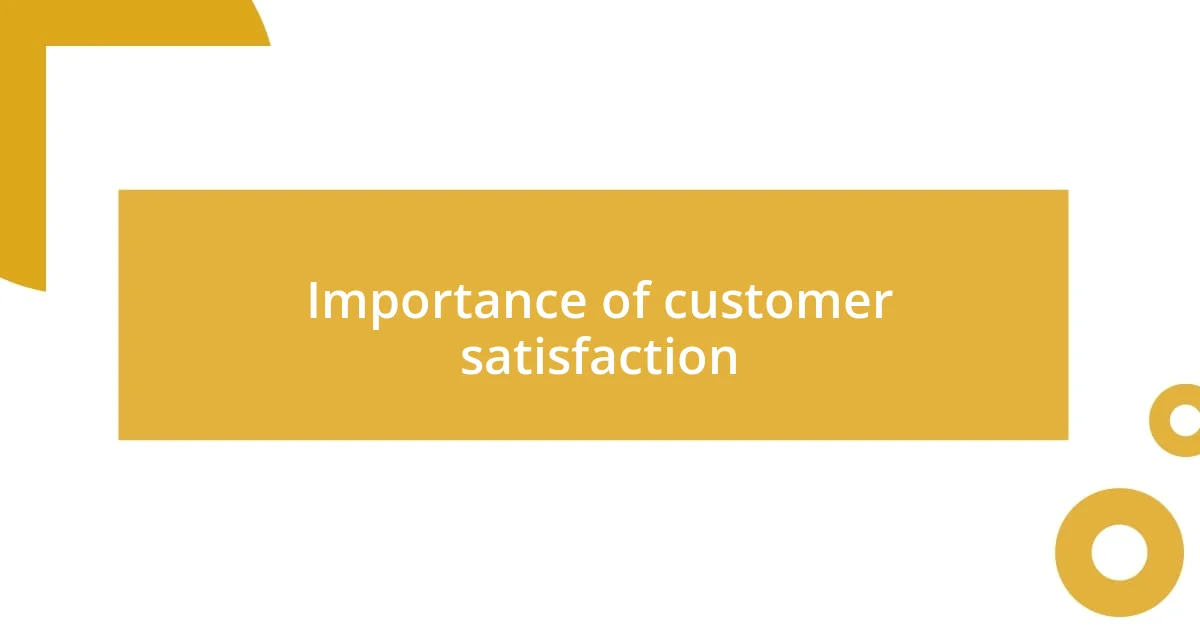
Importance of customer satisfaction
Customer satisfaction is the heartbeat of any successful business. When customers feel valued, they tend to come back, driving sales and loyalty. I remember a time when a restaurant not only got my order right but also surprised me with a complimentary dessert for my birthday. That simple act made me feel special and created an emotional connection that kept me returning to that place.
Here are a few key reasons why customer satisfaction is crucial:
- Loyalty: Satisfied customers are more likely to become repeat customers.
- Referrals: Happy customers recommend your business to others, enhancing your reputation.
- Feedback: High satisfaction levels create an open channel for constructive feedback, leading to improvement.
- Competitive Edge: Businesses that prioritize customer satisfaction often stand out in a crowded market.
- Revenue Growth: Content customers contribute more to overall sales, creating a win-win situation.
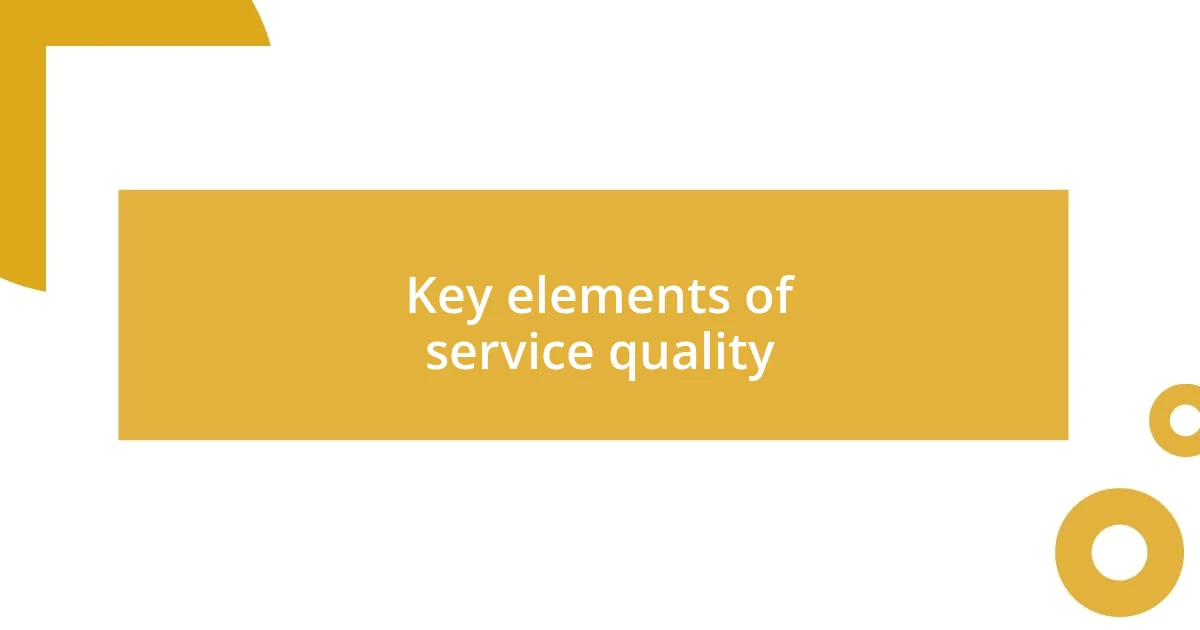
Key elements of service quality
Service quality hinges on a few key elements that play a pivotal role in shaping customer experiences. For instance, reliability is essential; customers need to trust that a service will be delivered consistently. I once had a subscription service that lived up to its promise every month, arriving exactly on time without fail. Such reliability not only built my trust but also made me feel secure in my choice.
Another vital aspect is responsiveness—how quickly and effectively staff respond to customer inquiries or issues can make all the difference. I remember visiting a local tech store when my laptop had issues just before a big presentation. The staff jumped into action, swiftly repairing it while providing updates. That attentiveness didn’t just save my day; it left a lasting impression of their commitment to customer care.
Furthermore, empathy is crucial in service quality. I’ve found that when employees take the time to listen and genuinely understand my concerns, it elevates the entire experience. Once, when I was having a rough day, a barista noticed and offered me a complimentary drink after our brief chat. That simple act of kindness transformed my mood and deepened my loyalty to that café. Isn’t it remarkable how emotional connections can enhance service quality?
| Key Element | Description |
|---|---|
| Reliability | Consistency in delivering promised services, creating customer trust. |
| Responsiveness | The ability to swiftly address customer inquiries and issues, enhancing satisfaction. |
| Empathy | Understanding and relating to customer needs and emotions, fostering deeper connections. |
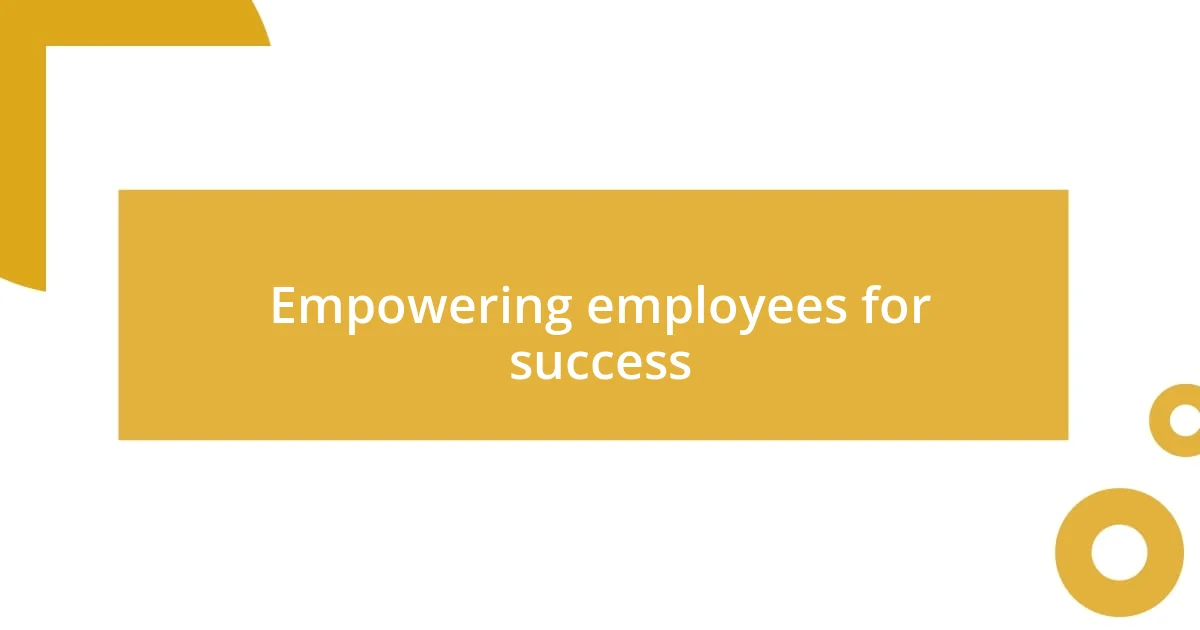
Empowering employees for success
Empowering employees is a game-changer in service excellence. When employees are given the tools and autonomy to make decisions, I’ve seen firsthand how it transforms their interactions with customers. For instance, at a small bookstore I frequented, the staff had the authority to create personalized discounts for regular customers. This not only boosted their morale but also made me feel appreciated, deepening my connection to the store.
Consider how much more engaged and motivated an employee becomes when they feel trusted. I once worked at a café where we were encouraged to come up with our own special of the day. The thrill of brainstorming creative flavor combinations truly enhanced the service atmosphere. I noticed that we were all more energized and eager to share our favorites with customers. Have you ever experienced a moment like that, where you can sense the joy of the team radiating through their service?
An empowered workforce doesn’t just benefit customers; it also fosters a culture of excellence within the company. I’ve observed that when employees feel respected and valued, their commitment to the company skyrockets. A friend of mine, who manages a wellness center, made it a point to regularly highlight staff achievements in meetings. This simple practice created a positive feedback loop, leading to exceptional service and a loyal clientele. Isn’t it inspiring to think about how small shifts in empowerment can lead to monumental changes in employee attitudes and customer satisfaction?
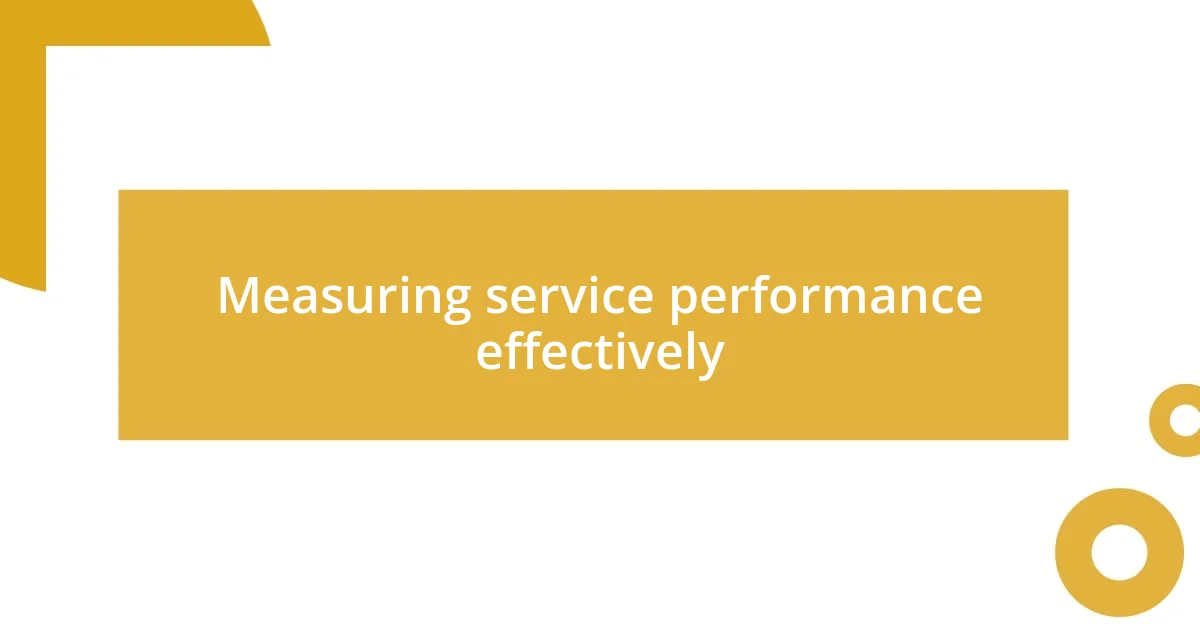
Measuring service performance effectively
To gauge service performance effectively, I believe that both quantitative and qualitative measures must be considered. Metrics like customer satisfaction scores and Net Promoter Scores (NPS) offer a clear, numerical representation of how well a service is being received. However, I’ve experienced that sometimes, numbers alone don’t capture the essence of customer feelings. For instance, after a particularly disappointing hotel stay, I noticed that while the reviews rated them fairly, the underlying frustration from guests was palpable in the comments. It illustrated to me that a deeper dive into feedback can reveal valuable insights.
Understanding the voices behind those numbers matters. I often find it beneficial to conduct follow-up surveys or personal outreach to ask specific questions about what went well and what didn’t. I remember when I once filled out a very detailed survey from an airline after a flight delay. I wrote passionately about the situation, and to my surprise, someone actually called me to discuss it further. That conversation left me feeling valued and seen, reinforcing my loyalty to that airline. Isn’t it interesting how a simple act of asking can provide clarity and strengthen relationships?
Another effective strategy I’ve come across is implementing mystery shopping. Having an unbiased external perspective can provide insights that differ from internal evaluations. I was part of a panel that reviewed a restaurant’s performance based on a mystery shopper’s experience. Their detailed report revealed gaps in service that we hadn’t noticed ourselves, highlighting the importance of fresh eyes in maintaining high standards. Who would’ve thought that a little surprise could lead to such a big impact on service quality?
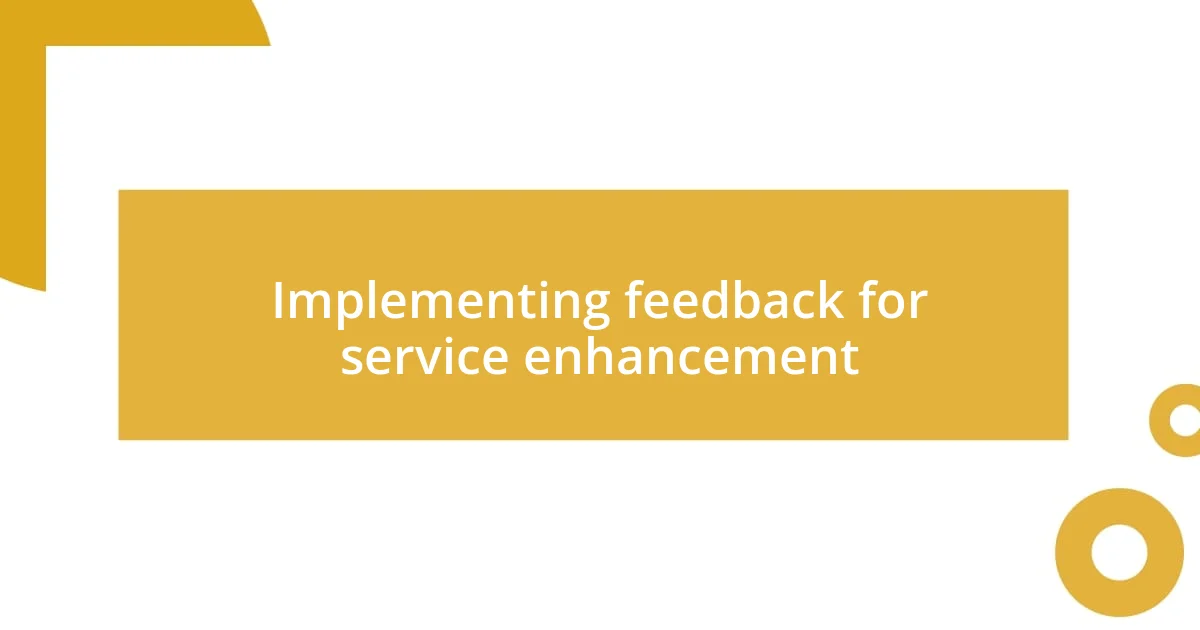
Implementing feedback for service enhancement
Gathering and implementing feedback is crucial for enhancing service quality. I remember a time at a tech support center where we set up a simple suggestion box. It surprised me how many customers took the time to share their thoughts. Their insights ranged from minor tweaks to major service alterations, and we were able to implement several of these suggestions. The result? A noticeable increase in customer satisfaction. Isn’t it amazing how a small change can trigger a wave of positive energy?
One effective strategy I’ve seen is conducting regular team debriefings to discuss feedback. When I was part of a team at a restaurant, we used to gather after shifts to talk about the day’s experiences. We would share customer feedback—both good and bad—and brainstorm ways to enhance our service. I vividly recall a busy Saturday night when one of my coworkers suggested we improve our wait time communication with diners. Implementing that simple suggestion led to immediate improvements in customer satisfaction. Don’t you think that collaboration can often spark the best ideas?
Moreover, I’ve noticed that showing stakeholders how their feedback resulted in change can create a powerful loop of continued improvement. In a retail setting, we once highlighted customer suggestions on our social media pages, showcasing how we transformed their ideas into reality. The reactions were heartwarming. People felt valued and engaged, and it created a sense of community around our brand. Have you ever felt that connection when you see your feedback meaningful to a service? It truly reinforces the bond between the company and its customers, making everyone feel like they’re part of something bigger.















